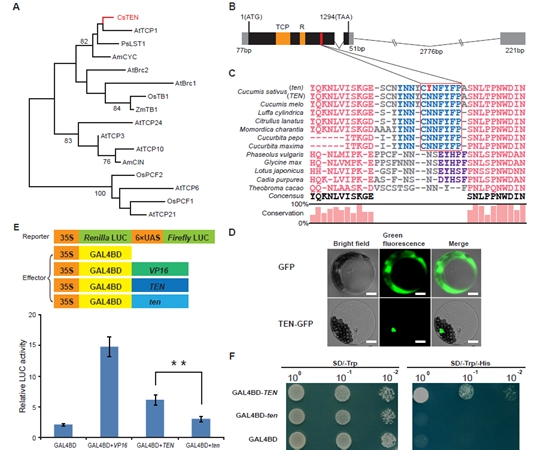分享到
CAAS Researchers Reveal a TCP Transcription Factor Essential for Tendril Development in Cucumber
Rare variants are important to agriculture, and the rare traits such as non-shattering of rice and dwarfism of wheat are fixed and selected during domestication. Recently, the Innovation Research Team of Functional Genomics from the Institute of Vegetables and Flowers (IVF), Chinese Academy of Agricultural Sciences (CAAS) exploit a strategy of rare variation mapping to discover a TCP gene essential to tendril development in cucumber (Cucumissativus L.). The results have been published online in Molecular Plant on October 24, 2015.

Tendrils are specialized climbing tools of cucumber, however, the homologous nature of cucumber tendril is controversial dating back to the time of Charles Darwin. In modern greenhouse, tendrils of cultivation of cucumbers are dispensable, and the coiling of tendrils actually requires additional energy investment from the cucumber plants and more labor from farmers in practice. Cucumber without tendrils is becoming the new breeding objective for plant architecture of cucumber.
In a collection of 3,342 lines, the scientists discovered a unique tendril-less line that forms branches instead of tendrils and therefore, loses its climbing ability. They hypothesized that this unusual phenotype was caused by a rare variation, and subsequently identified the causative single nucleotide polymorphism (SNP) based on the data of cucumber genome, variome and transcriptome. The affected gene TEN encodes a transcriptional factor, which belongs to the CYC/TB1 clade of TCP transcription factor family. TEN is conserved within the cucurbits and expressed specially in tendrils, representing a new organ identity gene. The variation occurs within a protein motif unique to the cucurbits and apparently impairs its function as a transcriptional activator. Analyses of transcriptomes from near-isogenic lines identified downstream genes required for tendril’s capability to sense and climb a support. This study provides an example to explore rare functional variants in plant genomes.
This research was supported by funding from the National Natural Science Foundation of China (NSFC; 31225025) and the National Program on Key Basic Research Projects in China (the 973 program; 2012CB113900), Chinese Ministry of Finance (1251610601001), and CAAS Science and Technology Innovation Program.
For more information please visit:
http://dx.doi.org/10.1016/j.molp.2015.10.005

In a collection of 3,342 lines, the scientists discovered a unique tendril-less line that forms branches instead of tendrils and therefore, loses its climbing ability. They hypothesized that this unusual phenotype was caused by a rare variation, and subsequently identified the causative single nucleotide polymorphism (SNP) based on the data of cucumber genome, variome and transcriptome. The affected gene TEN encodes a transcriptional factor, which belongs to the CYC/TB1 clade of TCP transcription factor family. TEN is conserved within the cucurbits and expressed specially in tendrils, representing a new organ identity gene. The variation occurs within a protein motif unique to the cucurbits and apparently impairs its function as a transcriptional activator. Analyses of transcriptomes from near-isogenic lines identified downstream genes required for tendril’s capability to sense and climb a support. This study provides an example to explore rare functional variants in plant genomes.
This research was supported by funding from the National Natural Science Foundation of China (NSFC; 31225025) and the National Program on Key Basic Research Projects in China (the 973 program; 2012CB113900), Chinese Ministry of Finance (1251610601001), and CAAS Science and Technology Innovation Program.
For more information please visit:
http://dx.doi.org/10.1016/j.molp.2015.10.005
By Wang Shenhao
zhangzhonghua@caas.cn
zhangzhonghua@caas.cn
Latest News
-
 Apr 18, 2024Opening Ceremony of the Training Workshop on Wheat Head Scab Resistance Breeding and Pest Control in Africa Held in CAAS
Apr 18, 2024Opening Ceremony of the Training Workshop on Wheat Head Scab Resistance Breeding and Pest Control in Africa Held in CAAS -
 Apr 03, 2024IPPCAAS Co-organized the Training Workshop on Management and Application of Biopesticides in Nepal
Apr 03, 2024IPPCAAS Co-organized the Training Workshop on Management and Application of Biopesticides in Nepal -
 Mar 28, 2024Delegation from the School of Agriculture and Food Science of University College Dublin, Ireland Visit to IAS, CAAS
Mar 28, 2024Delegation from the School of Agriculture and Food Science of University College Dublin, Ireland Visit to IAS, CAAS -
 Mar 25, 2024Director of World Food Prize Foundation visited GSCAAS
Mar 25, 2024Director of World Food Prize Foundation visited GSCAAS -
 Mar 20, 2024Institute of Crop Sciences (ICS) and Syngenta Group Global Seeds Advance Collaborative Research in the Seed Industry
Mar 20, 2024Institute of Crop Sciences (ICS) and Syngenta Group Global Seeds Advance Collaborative Research in the Seed Industry
